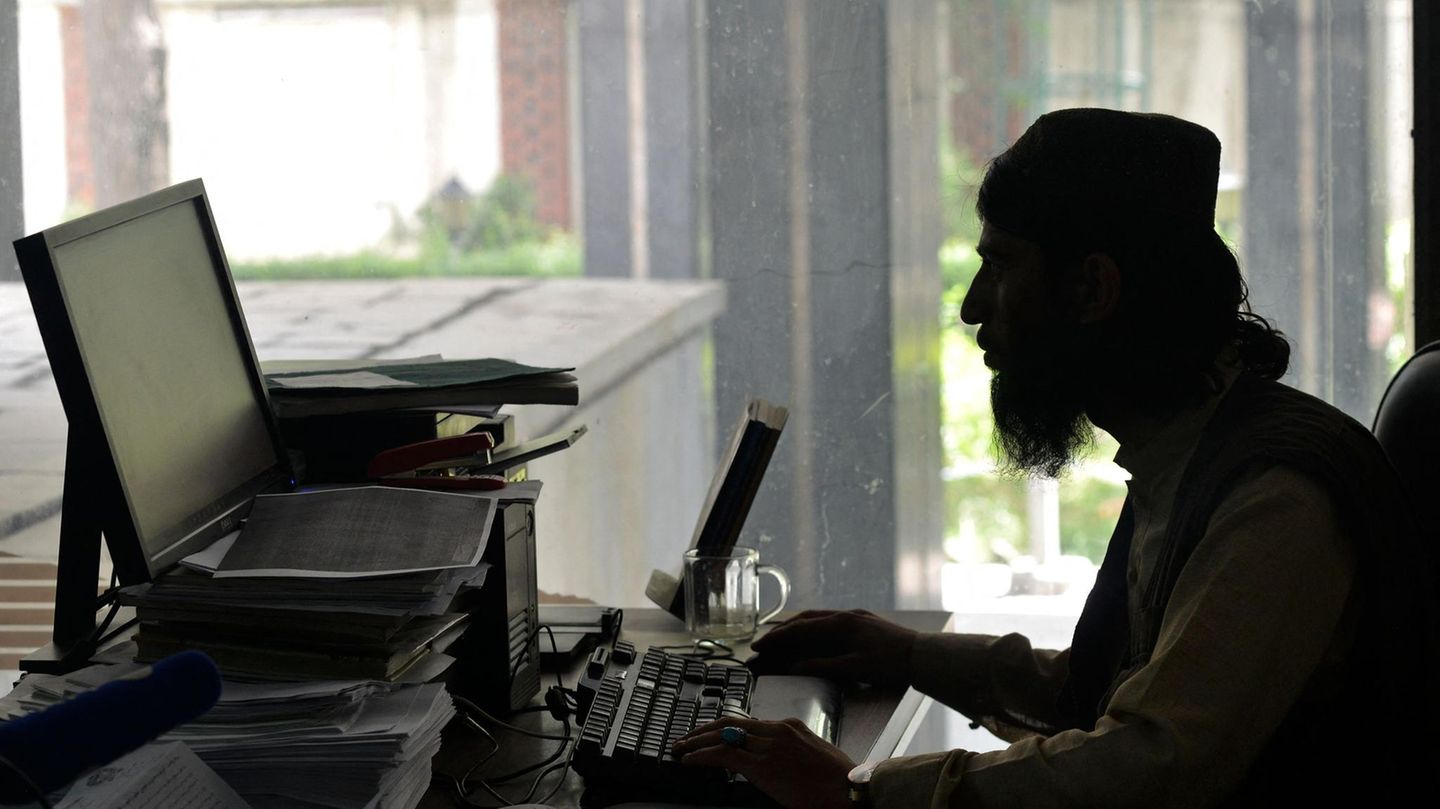In August 2021, the Taliban took power in Afghanistan – and with it the government and administration. But the desk jobs there apparently don’t appeal to some of the radical Islamic fighters, as interviews show.
Sitting at the desk in front of the computer screen from 9 a.m. to 5 p.m., drinking thin coffee and having trivial small talk with colleagues. Office jobs can be pretty boring.
The Taliban apparently think so too: since the radical Islamic terrorist organization took power in Afghanistan in August 2021, they have been in administration and government – and now also work at desks in front of computers, which some consider monotonous compared to their old jobs .
For the Afghanistan Analysts Network (AAN), an independent and non-profit political research organization, Afghanistan analyst Sabawoon Samim spoke to five Taliban and asked them how they found the new life in Kabul. The results of the interviews – which were conducted in October and November 2022 – were published by the AAN on February 2nd.
Some of the Taliban have never been to Kabul before
The five Taliban interviewed were between 24 and 32 years old and had spent between six and eleven years in the Taliban movement. With the seizure of power, they were given jobs in the new government, for example in ministries.
Samim spoke to them about how they got to know Kabul and its residents, what they think of their new jobs and the noisy traffic in the capital. Because many of the Taliban fighters come from humble villages where they led modest lives. Lives that only knew war.
Founded in 2009, it describes itself as an independent, non-profit policy research organization. With their work, they want to “better inform politicians and improve the understanding of Afghan reality.” AAN analysts regularly speak at conferences and briefings around the world and are frequent media commentators. The AAN is .
A 32-year-old Taliban reported: “I’ve never been to Kabul before. We heard from the radio and from people who traveled there that the city was built very nicely by the Americans and (Hamid) Karzai. But still, it’s not as nice as it should have been.” Nevertheless, he likes the “modernized” Kabul: electricity, new buildings, hospitals, schools, Internet.
Complaints about traffic and working hours
But what bothers him the most is the traffic. “Last year it was bearable, but in recent months it has become more and more congested. People complain that the Taliban brought poverty, but when I look at the traffic and the large number of people in the bazaars and in the restaurants look, I wonder where this poverty is.”
What he doesn’t like either: the restrictions after the seizure of power. There was a high degree of freedom in his Taliban group. “Nowadays, however, you have to be in the office before 8 a.m. and stay there until 4 p.m. If you don’t go, you’re considered absent and (your wages for) that day will be deducted from your salary. We’ve gotten used to that, but in the first two or three months it was particularly difficult.”
Due to the working hours, he also has little time to meet other Taliban – after all, they also have to work.
A 24-year-old Taliban, who served as a sniper for the terrorist organization and got a job with the police in Kabul, sees it similarly.
Withdrawal of troops from Afghanistan
Now the Taliban are behind the wheel: the end of the US military operation in pictures
“I often miss the time of jihad”
He too complained about the restrictions that the new working life in Kabul brings with it. “The Taliban used to be free from restrictions, but now we’re in one place, behind a desk and a computer, 24 hours a day, seven days a week. Life has become so grueling; you do the same thing every day.”
The times of jihad were simpler. “All we had to do was make plans for ta’aruz (attacks) against the enemy and for retreat. The people did not expect much of us, and we bore little responsibility for them, while now, when someone goes hungry can be held directly responsible for it.”
A 27-year-old Taliban, who now works at the Interior Ministry, said of the Taliban’s old days before they took power: “I’m reasonably happy with my job, but I often miss the time of jihad. During that time, every minute became of our lives counted as service to God.”
Taliban long for old times
He also criticized that people are “fully engaged” in gaining fame and amassing wealth. “We used to do everything for the sake of Allah, but today the opposite is the case.” Many Taliban have put their past behind them. “Many of us have now retired to our offices and palaces and given up this simple life.”
A 25-year-old supporter of the group also sees the fact that the cohesion of the Taliban changed when they took power in 2021. “During the jihad, you wouldn’t have been able to tell the difference between a commander and a foot soldier like me. We sat together, we talked quietly, and they were very kind to us. Our superiors fought alongside us, and we wept all together for our martyrs.”
In the meantime, however, many Taliban leaders have turned their backs on “their comrades”. “Sometimes I miss life in jihad with all its good sides.”
Taliban are “addicted to the internet, especially Twitter”
The 25-year-old works in a ministry. He said of himself and his Taliban colleagues: “We are very clever and intelligent, and we learn quickly.” He himself claimed that he did his job better than many of his colleagues. Nevertheless, he has little to do, which is why he spends a lot of time on Twitter. “We are connected to fast Wi-Fi and internet. Many mujahideen, myself included, are addicted to the internet, especially Twitter.”
For the researcher and analyst Sabawoon Samim, the Taliban’s statements say above all that the radical Islamic fighters have had many personal problems as a result of their victory over the Afghan government.
“By and large, all of our interlocutors preferred their time as a fighter to what they considered jihad. Life was simple then. They had few responsibilities or complications. All they faced was the war and the battlefield connected.”
The Taliban now have to earn money for their families
The integration into the formal order of the state administration has developed into a major problem for the Taliban interviewed. The old structures with which they were familiar and satisfied disappeared with the takeover; the dynamic of her life has changed completely.
Many of the perceived freedoms have disappeared for them. Now they would have to abide by official rules and laws that were previously unknown to them. The Taliban now have to earn money to support their families. This is also new for her.
“The jihad, a religious obligation that freed them from such everyday worries, is over: they now have to work like everyone else for the survival of their families.”
Source: Stern
I have been working in the news industry for over 6 years, first as a reporter and now as an editor. I have covered politics extensively, and my work has appeared in major newspapers and online news outlets around the world. In addition to my writing, I also contribute regularly to 24 Hours World.




